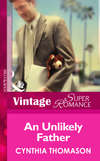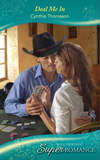Buch lesen: «Christmas in Key West»
Christmas in Key West
Cynthia Thomason
Table of Contents
Cover
Title Page
About the Author
Dedication
Chapter One
Chapter Two
Chapter Three
Chapter Four
Chapter Five
Chapter Six
Chapter Seven
Chapter Eight
Chapter Nine
Chapter Ten
Chapter Eleven
Chapter Twelve
Chapter Thirteen
Chapter Fourteen
Chapter Fifteen
Chapter Sixteen
Chapter Seventeen
Chapter Eighteen
Copyright
Cynthia Thomason writes contemporary and historical romances and dabbles in mysteries. She has won a National Reader’s Choice Award and the 2008 Golden Quill. When she’s not writing, she works as a licensed auctioneer for the auction company she and her husband own. As an estate buyer for the auction, she has come across unusual items, many of which have found their way into her books. She has one son, an entertainment reporter. Cynthia dreams of perching on a mountain top in North Carolina every autumn to watch the leaves turn. You can read more about her at www.cynthiathomason.com.
This book is dedicated to my mother,
Barbara Brackett, with love
for all the Christmases past, present and future.
Chapter One
REESE HUNKERED DOWN on one knee and burrowed his fingers into a patch of soft golden fur covered by a colorful neckerchief. “You have a good day, buddy,” he said to the Labrador retriever. “Take a couple of naps for me.” Giving the dog a goodbye scratch behind the ears, he walked outside and got into his patrol car. He’d already talked to the dispatcher on duty. The night had been a quiet one. Reese hoped the calm would continue at least for the next three days, at which point a new crop of tourists would descend upon Key West in the four-day Thanksgiving break.
He’d just backed out of his driveway when a message came through on his radio. Instantly tuning in, he hoped the call from the station would be nothing more important than a request to stop for doughnuts. “This is Reese,” he said into the mic on his shoulder. He preferred using his real name instead of his official police-speak identity when he could. “What’s up?”
His hope for continued calm evaporated when the dispatcher said, “It’s Huey Vernay, Reese. He’s at it again.”
Reese gripped the steering wheel in response to the coiling in his stomach. Anything to do with Huey, his trinket business or the happenings at Vernay House produced this reaction. “Did we get another complaint from a tourist about his attitude?”
“Nope. This is worse.”
The coiling resulted in an all-too-familiar pain in his neck. “What’s he done now?”
“Edna Howell just called. She said Huey started another fire in his backyard and the smell came over her fence. She claims that if she opens her windows, she’ll suffocate from toxic fumes.”
“Here we go again,” Reese muttered as he turned onto Duval and headed toward Southard Street, where the ten-room Vernay House had stood since the late 1850s. He leaned out the window, caught a whiff of burning rubber. “Shit.”
“What’s that?” the dispatcher asked.
“Sorry, Merlene. Call the fire department. I’m only a couple of blocks from Huey’s now. I’ll go on over.”
“Roger that, Reese. Do you need backup?”
As much as he’d like to foist the responsibility on anyone else in the department who would take it, he declined. He didn’t see flames shooting into the air, so that was a good sign. “Probably not. But I’ll want a half bottle of aspirin when this is over, so make sure we have some.”
The dispatcher chuckled before signing off, and Reese gave up hope of filling his thermal mug with coffee from Martha’s Eye Opener Café. He flipped the switch on the car’s light bar and sped toward Southard Street.
REESE PULLED TO A STOP in the plume of smoke drifting over the wraparound porch of Vernay House. He got out of the cruiser and waved his hand in front of his face to dispel the foul air. Walking around to the backyard, he spied Huey Vernay standing upwind from a smoldering pit of who knows what. Thank goodness the flames that still existed were minor, but acrid gray clouds hung over the old Classic Revival mansion.
Reese strode to the big man, who was bare-chested except for the apron of his denim overalls. Smudges of soot blotched his face and arms.Atypical scowl creased his face.
“What the hell do you think you’re doing, Huey?” Reese asked.
The man took a drag on the stub of his cigarette and released a long, wispy stream of smoke. He flicked the butt to the dirt and ground it in with the heel of his boot. Looping his thumbs through the straps of his overalls, he said, “What’s it look like?”
Reese wanted to say, Insanity, but refrained, knowing that answer was too close to the truth.
Huey raised his bushy white eyebrows in the condescending smirk he’d perfected after years of boasting about his blue-blooded-Louis-the-Something background. Genetically speaking, French ancestry, even ties to royalty, didn’t count for much in modern-day Key West, but Huey refused to accept that. “I’m abiding by the almighty Community Improvement Board and the code enforcement officer’s order to clean my place up.”
“You know darn well you can’t do that by lighting a fire,” Reese stated. “I warned you about this a week ago when you set that blaze in your garbage can.”
“I’m doing it different this time,” Huey retorted. “You complained that I didn’t have a proper containment screen on the top of the can, so now I’m burning my trash in the open. There isn’t a law against that as far as I’ve heard.”
Reese looked down at the pile of garbage slowly disintegrating into spitting embers. “I’ve only been here a couple of minutes, Huey, and I’ve already come up with five codes you’re breaking right now.”
“Well, hell, Reese, you can’t have it both ways. The island’s gestapo can’t tell me my home is an eyesore and then have you stop by and prevent me from sprucing it up.”
Sirens sounded in the distance. Aware that even laid-back Key West was in the midst of rush hour, Reese tuned to the radio channel connecting him to the island’s fire department. “Tell your boys they can slow down,” he said to the dispatcher. “The fire’s under control. I still need them here to do a damage assessment, but there’s no immediate threat to property.” He signed off and glared at Huey. “I’m going to my car to get the paperwork,” he said. “You’re getting citations this time.”
Huey’s eyes, as gray as the smoke around him, became slits. He tugged on the full beard that had earned him first place in the Ernest Hemingway look-alike contest four out of the past ten years. “What for? Doing my civic duty?”
Ignoring the sarcasm, Reese went around the house to retrieve the necessary reports. After he’d written the first citation, he walked back and handed a copy to Huey. “This is for burning household waste.”
Huey stared at the paper that had been thrust into his hand. “Of course I’m burning household waste. That’s exactly what that officious son of a bitch you sent out here told me to get rid of.”
“You can’t burn it, Huey. You can only set fire to lawn debris. I gave you a copy of the rules the last time I was here.”
“You did? Guess I must have burned it in this pile by mistake.”
Refusing to be goaded into making an equally sarcastic comeback, Reese studied the smoldering items in the widening circle of blackened weeds and said, “You’ve got a rubber tire in there, along with plastic and metal containers that, if I knew what they’d once held, might scare the crap out of me.” He handed Huey a second ticket. “This is for not having your fire within the appropriate setback. You’re too close to the fence line.”
Huey stared at the fence separating his property from his neighbor’s. “That damn busybody Edna Howell. The old biddy ratted me out—”
“And for not clearing an area around the pit to ensure containment,” Reese continued. He wrote the third citation. “This is for not having a shovel and hose nearby in case the fire spreads.”
He was starting a fourth ticket when Huey reached out and placed his big hand over Reese’s. “You’ve made your point. Now we both know you can write.”
Reese frowned at him. Huey was consistently the most difficult resident on the island to deal with. He held on to grudges longer than anyone Reese had ever known. And Huey had a hell of a lot of grudges to stew over, including one against Reese and his family that dated back a lot of years. “I thought I made all this clear last week when you had the previous fire,” he said. “I should have ticketed you then.”
Huey ruffled the papers in Reese’s face. “I’ll tell you what you can do with your citations, Mr. Big Shot.”
Reese struggled to hold on to his temper. “You want me to arrest you, Huey? Because I will. You’re threatening an officer of the law—”
“Phooey. I remember when you were still wet behind the ears. It wasn’t so many years ago, Reese Burkett, that you were on the other side of the law more often than not, and don’t you forget it. Many’s the night I sat on my porch and watched the cops chasing you and that Cuban gang you hung out with.”
Reese sighed, admitting to himself that Huey had a point. Reese had gotten into a lot of trouble on this island. That was why folks had been surprised he’d accepted a position with the Key West Police Department when he’d gotten out of the navy.
He started to remind Huey that both of them had episodes in their pasts that were better left buried, but his words were interrupted by a crew of firemen coming around the side of the house.
Larry Blanchard, fire captain and another Key West native, warned Huey about his reckless actions. “I should charge you for what this unnecessary call cost the citizens of this town,” he said.
“Go ahead.” Huey clasped his wrists together and held them in front of him, daring someone to slap cuffs on him. “I can’t pay it. You know what it’s like for a small, independent businessman these days. Can barely keep food on the table.”
Blanchard rolled his eyes, and it was all Reese could do not to point out that Huey hadn’t made a decent living in years. Having ruined his reputation as the local handyman by charging folks for inferior work, he now sold cheap souvenirs to tourists from a mobile vendor’s cart during the nightly sunset festivities on Mallory Square. Still, Reese found it hard to believe that Huey had trouble paying his grocery tab. The six-footer tipped the scales at well over two hundred pounds.
“You’ve got fourteen days to pay these citations,” Reese said.
Huey passed his hand over his collar-length white hair. “Don’t hold your breath. I won’t have the money in fourteen weeks. And if I did, I wouldn’t give it to you jackass bureaucrats.”
“Then I’ll be back to get you.”
“Fine. I’ll be waiting. The people of this island can provide me with a bed and three squares a day.”
Although Huey had been an eyewitness to some trouble Reese had gotten into thirteen years ago, the last thing Reese wanted was to arrest the guy. He dreaded listening to Huey’s complaints while he served time. And he certainly didn’t relish providing Huey with any more excuses for not earning a living. But mostly Reese didn’t want to haul Huey in because the Vernays had been on this island for more than a hundred and fifty years. Not all of their history here was good, but they were as much a part of Key West lore as Stephen Mallory, John Simonton or Samuel Southard, men who’d had streets named after them because of their illustrious contributions to the island. No street was named for the Vernays.
Regretfully, Reese had to accept that he was running out of options with Huey. The stubborn old guy wasn’t giving him any choice other than jail. Reese scratched his head. Except for the option he’d used as a last resort once before in similar circumstances. Maybe Loretta could talk some sense into her ex-husband this time, too.
He stopped the fire captain as he circled the contaminated pile. “How’s it look, Larry?”
“It’s out, but there could still be some hot spots. To totally decontaminate the site, we should clear the whole pile out of here.”
Reese nodded toward Huey’s rusty old truck, which sat in front of the decrepit carriage house. “Never mind,” he said loudly. “Huey’s cost the city enough for one day.” He glared at the man. “You haul this trash down to the sanitation site after it cools, or call the junk dealer to come take it away. You hear me?”
“I’m not deaf, Reese,” he snapped. “Just pissed off, and that doesn’t affect my hearing.”
“I’m just making myself clear,” Reese said. “I’m stopping back this afternoon to see that you’ve started cleaning this toxic mess up. And if it isn’t all gone in two days, I’ll slap you with another fine.”
“That doesn’t surprise me.”
Reese got in his cruiser and headed to the station. He’d missed breakfast, but that wasn’t the main reason he was already thinking about lunch. He’d made up his mind to go to Phil’s Pirate Shack on Caroline Street. Hopeful about talking to Loretta Vernay, he could also order a grouper sandwich to go.
EVERY TIME A CUSTOMER opened the door at Phil’s, a grease-smeared plastic pirate’s head hanging on a hook over the entrance cut loose with a squawky rendition of “Ho, Ho, Ho and a Bottle of Rum.” Reese entered the establishment at noon and glanced around at the usual crowd of locals who knew this was the place for the best seafood on the island. And unlike many of the restaurants in town, the prices were fair.
A few customers hollered at him, mostly construction workers building or remodeling ever-expanding resort hotels, or guides and charter operators from the area’s marinas. These were guys for whom the fresh-catch scent at the Pirate Shack was cologne. Reese walked over to a table where the two mechanics from Burkett’s Paradise Marina were chowing down on fish and chips. “How’s everything going?” he asked the men.
“Wouldn’t do any good to complain,” Bill MacKenzie said. He scooted a chair away from the table with the toe of his work boot, indicating Reese should join them.
He waved off the invitation. “I’m getting a takeout,” he said.
Bill took a swallow from a long-necked beer bottle. “We wanted your father to eat with us, but your mom asked him to pick out some fabric for curtains or something.”
Reese chuckled. His mother was always doing something to their Gulf-side stilt house—a fact that made Frank Burkett cringe. At this stage in his life, Reese’s dad was basically content with a comfortable recliner and a television. The marina had provided a good living for the family since he’d resigned as a cop and opened the business twenty years earlier. And his wife was a major reason for that success. Ellen Burkett was an excellent manager.
“You guys enjoy your lunch,” Reese said, scanning around the restaurant for Loretta. He spied her coming out of the kitchen with a platter of food skillfully balanced on her hand. Reese smiled at her. He didn’t know Loretta’s age, but he figured her for around fifty, sixteen years older than he was. She looked good. Kept her short hair a light blond, her figure trim and appealing.Alot of women who’d lived most of their lives in the unforgiving island sun showed the effects of ultraviolet rays in creases around their eyes and lips, as well as scars from skin cancer treatments. Not Loretta. Reese guessed she must have a closet full of wide-brimmed hats. And he knew for certain that she was one Vernay who would always have a smile for him.
She gestured with her free hand. “Be with you in a minute, Reese.”
He propped his foot on the empty chair and talked with his friends until she was free. When she approached, her order pad at the ready, he led her away from the others.
“What can I get you, honey?” she asked him.
“A grouper sandwich to go, coleslaw instead of fries. But that’s not the only reason I’m here.”
“Oh?” She grinned. “Anything else, and you’ll have to check with Phil.”
Reese smiled. Loretta and Phil had been together for almost twelve years, once she’d finally given up on Huey, packed her bags and walked out of Vernay House for good. And since that time, the mansion had suffered twelve years of nobody caring about it.
“If I didn’t know that Phil could beat me with one hand tied behind his back, I’d be tempted,” Reese said. “But this has to do with an entirely different matter.” He sobered, cleared his throat and watched Loretta’s blue eyes narrow suspiciously. She was a smart woman and caught on fast.
“You’re not here about Huey, are you?”
Keeping his expression resolute, he replied, “I know you’re busy, but I need to talk to you.”
She lowered her voice. “I asked you to leave me out of Huey’s problems, Reese. Besides, Phil could come out of the kitchen anytime, and if he hears us discussing Huey, he’ll blow a gasket.”
Reese stated the obvious, hoping it would make a difference. “Huey’s his brother, Loretta. He must care about what happens to him.”
“He did once,” she said, “but not anymore. Phil has vowed never to lend him money again or come to his rescue.” She leaned in close and spoke in a whisper. “I know Huey was hurt when I left him for Phil, but darn it, Reese, it’s been twelve years, past time for Huey to get on with his life.”
Reese wasn’t sure he agreed. In fact, the way the romantic triangle had ended up was one aspect of Huey’s life that earned Reese’s sympathy. Another was that Huey had said goodbye to his daughter shortly before Loretta walked out on him.
“Phil doesn’t even like me talking about Huey,” Loretta said, “and frankly, that’s how I want it, too.”
“I’m going to have to arrest him, Loretta.”
She sagged against the bar. “Oh, come on, Reese. You don’t mean that. Huey’s a problem. Nobody knows that better than me. But arrest him? He’s sixty-five years old. And he’s not a criminal.”
“Maybe not in the sense you’re thinking, but he’s a public nuisance and he’s breaking the law. At least once a week I’ve got to drive over to his place and remind him that living in the Conch Republic doesn’t mean that we’re divorced from the rest of the country. We have the same laws here as on the mainland, and Huey seems to enjoy stretching them to the limit.”
Her voice filled with resignation, she asked, “What did he do this time?”
Reese explained about the fire, Mrs. Howell’s phone call and the complaints they’d gotten from tourists recently. “No wonder he doesn’t make a living selling those cheap souvenirs,” Reese said. “One encounter with Huey, and nobody wants to buy anything he’s offering. All the tourists think about is getting away from him.”
Loretta shook her head. “I don’t know what I can do.”
“I’ll give you a chance to talk to him one more time. He has fourteen days to pay his latest citations, and a couple of days to dispose of a load of offensive garbage in the yard. If he does those things, and if you can convince him to abide by the laws around here, I’ll cut him a break…again.”
She sighed. “Huey doesn’t like to listen to me, Reese. You know that.”
Reese felt bad for putting Loretta in the middle of this situation, but he knew darn well she’d never forgive him if he arrested Huey without telling her first. She might claim to have given up on the man, but somewhere deep inside her, an affection for him still flickered.
“Okay,” Reese said. “I understand your position, but I felt I owed it to you to tell you before I acted.”
She tapped her order pad on the bar. “I appreciate that. You still want your sandwich?”
“I’m happy to say Huey hasn’t ruined my appetite.”
She turned to go to the kitchen, but stopped after a few steps. Turning back, she said, “Actually, there’s one person, and one only, who might be able to get through to him.”
Reese knew exactly who she meant, and an image of a cute, blue-eyed blonde filled his mind. “I didn’t think it was my place to suggest Abby,” he murmured.
“He still listens to her,” Loretta said. “Not that he follows her advice. But if anybody can get him to behave himself, it would be our daughter.”
Reese was beginning to see a way out of this dilemma. “So what are you saying? That you’ll call her?”
“I hate to. She’s got her career in Atlanta. She’s busy. And she’s really not comfortable being here.”
Reese only nodded. He hadn’t seen Abigail Vernay in thirteen years. He was aware that she returned to the island sometimes. She still maintained a connection to Huey and her mother, but she stayed away from the public areas when she was here, and remained only a couple of days. Their paths hadn’t crossed in the seven years he’d been back.
All that supported what Loretta had told him. Abby did seem to have misgivings about coming home. Reese just hoped the history between them wasn’t one of the reasons.
What had happened was ancient history. She’d probably forgotten all about it. Still, Reese couldn’t be certain. Women’s memories were tricky things.
Der kostenlose Auszug ist beendet.





















